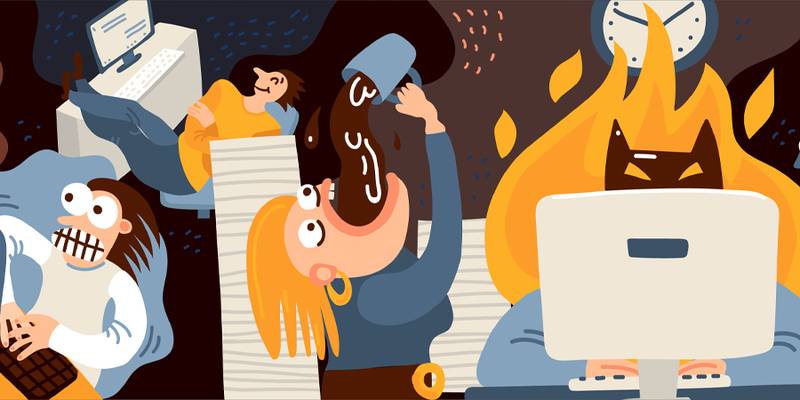Is digital hoarding messing with our mental health?

Recently, I had to find a mail that I received nearly a year ago. I was skimming through my inbox and realised there were over 8,000 unread or useless emails. Infuriated, I pushed off the task and decided to declutter my inbox! A few hours, gazillion unsubscribe clicks and several curses later, it was finally done. And, I was finally left with just a few hundred important emails and an unmatched inner peace. That is when I decided, it’s finally time to get rid of digital hoarding.
It was the same day, I realised that I had around 12,000 photos in my phone’s camera roll, another 10,000 in my WhatsApp photos folder, and about 500 contacts when I literally have five friends, and I also don’t remember the last time I cleared my text messages. Technically, I am drowning in digital clutter.
Digital clutter and hoarding
When we think of hoarding or clutter, we think of tons of clothes piled up in cupboards, a store room full of items, or anything that takes up physical space and we keep holding on to. But all those bookmarks, files, photos, messages, apps, and numerous icons — on our phones, tabs, and laptops — don’t take up any physical space but surely impact mental space. This is digital clutter. An inability to get rid of these files is digital hoarding.
In today’s day and age, digital space is available in abundance and at dirt-cheap prices. We have easy access to a large quantity of space, either on a physical device or on a drive or cloud. This clubbed with an unslakable need to capture everything happening in our lives, our OOTDs, our meals, the new buy, the fancy cocktail, the scenic views, is just leading to piles of data on our devices.
Moreover, we constantly feel the need to save things to revisit in future. Articles to read later, e-commerce sites to scan in our free time, reviews of places we plan to visit sometime soon, and outfit ideas to try out. We never stop and think if it is worth it. We relentlessly add more and more to the pile. Our FOMO (the fear of missing out) and the urge to never lose out on anything leads to overloaded digital spaces.
Many of us don’t clear our devices due to the fear of needing a deleted file sometime in the future. Clicking 50 photos, all in different poses, and refusing to delete any because one of those 50 striking similar photos might come in handy in future. That’s a classic example of digital hoarding. But the sad reality remains that the more we store, the less likely we are to revisit a file, let alone use it.
Remember, back in the day when everyone used film cameras? Our parents managed to capture their lives and our childhoods in a handful of photos! Those were real memories with real value.
Digital hoarding in comparison with physical hoarding
Digital hoarding is very similar to physical hoarding. In both cases, we place immense value on things or files. We form an unreasonable attachment to them, making it very difficult to part ways with them. Hoarding is usually characterised by:
- Feeling the need to save things
- Stress associated with discarding these stored things
- A feeling of emotional connection with things, irrespective of their actual value
- Accumulation of things, irrespective of usage and value
Emotional connection with things brings comfort to people. Not seeing or using something often but knowing that it’s present is a huge relief. But this exact thing is a very prominent reason for anxiety. Physical hoarding is a mental illness that impacts many people. If it ever so happens that digital hoarding is recognised as a mental illness too, in my opinion, the impact will be far-reaching. True, the physical impact of it is almost none but mentally, it can be distressing in the long run.
How is digital hoarding impacting us all?
Digital hoarding can have a significant impact on our mental health by causing feelings of anxiety, overwhelm, and even depression. Accumulating digital clutter, such as old emails, files, and apps, can make it difficult to organise and find files, thus leading to frustration and stress.
Additionally, digital hoarding makes it challenging to focus and be productive, leading to procrastination and low motivation. Constant distraction by all the data surrounding us and a reminder of unfinished tasks lead to a sense of guilt and inadequacy. Ultimately, digital hoarding can have a detrimental impact on our mental well-being and should be addressed proactively.
How all the data dump on our clouds can impact us
1. It makes us anxious
Most people hoard data and files to cushion themselves against future problems. Photos for memory’s sake, playlists for nostalgia, a bill we received over email for reference, anything and everything for comfort in future — all of it adding up in our storage leads to greater anxiety than comfort.
Looking for that one photo in 10,000s of them or one mail in a flooded inbox eats up so much of our mental peace and time. Other than this, most people live with the anxiety that they are one glitch away from losing all their data and they won’t have it when they will actually need it.
2. Clutters our minds
How much of our data have we already reviewed? When do we know what’s the right time to first analyse and organise all of our existing data before we add more to the pile? We just keep adding new files and information without using the pre-existing material. Something or the other will always be very meaningful, important, and too good to lose. Here’s a hard pill to swallow — most of it is trash. We will never go back to it, come what may. New information will keep replacing the old information’s value. Despite it all, the hoarder inside will not let go and continue to clutter our storage and minds.
This behaviour pattern leads to overwhelm, a feeling of disorganization and a lack of control. Often we fall short of ways to effectively deal with all the data at hand. Reducing heaps of data on our devices can help us feel more organized and in control of our lives. Which translates into greater feelings of calm and confidence.
3. Causes distraction and procrastination
How our digital clutter distracts us is closely related to how it leads to procrastination. With a huge amount of data, searching for something, if needed, takes up a lot of time.
Let’s be honest, most of us, while saving data, have no clear strategy for organising it, thus leaving behind a pool of mixed files. Similarly, when we look for a file, we again fall short of an effective strategy. This induces stress and more often than not, we just end up putting off the search and the task at hand. Thereby, procrastinating.
Another way it leads to procrastination is by the way of discretion. Imagine this: you sit down to write an article and realise that you have bookmarked a blog for reference. While searching for it, you stumble upon another unrelated article bookmarked for leisure reading. Turns out, you open it. One thing leads to another and two hours later, you have read several articles but not the one should have read.
Let’s take another example, shall we? You are working on a tight deadline when a friend texts asking you for a photo of hers that you clicked. Like a good friend, you keep aside the work to look for that one picture in the pool of the thousands. And inevitably, you start looking at all the other photos that are too good to not scan. There you are scrolling through the folder for no reason, oblivious of how much work you could have done in that time.
Conclusion
The best we can do is be mindful of our feelings and consumption. We all must acknowledge that saving so much content and information is counter-intuitive. While we all want to click numerous photos and make memories, save several articles and increase our knowledge pool, and so on, we need to be mindful of what we save and delete things that no longer serve us. Yes, our hearts will tell us not to do so as they might come in handy later. But we all know, we will not revisit most of our files. So let’s spare some time and commit to control and organise — purge and Marie Kondo our drives!






